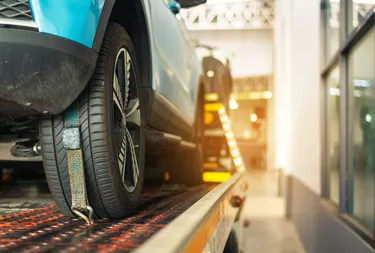
A lien on a car is a common occurrence. Typically, when a person finances a car purchase, the financing company has a lien on the car. The company reserves the right to repossess the car in the event of nonpayment by the purchaser. However, the car lien holder faces several regulations on their repossession rights.
Lien Holder Car Repossession Rights
Video of the Day
The right of repossession belongs to the person or company that holds the title to the vehicle, explains the Indiana Bureau of Motor Vehicles. The lien must still be valid. If the lien has been paid off but the title has not yet been transferred, the lien holder cannot repossess the car.
Video of the Day
The person repossessing the car must have the original documents detailing the lien and the powers that the lien grants to the repossessing party. If the repossessing agent does not have those documents, the company can still repossess the car if it has a valid court order authorizing it to do so.
Methods of Repossession
If you have a car with a lien, the lien owner must have attempted to collect the monies owed from you. In the absence of payment, the lien owner must notify the possessor of the vehicle of his intent to repossess. Afterward, the car lien holder may proceed with repossessing the car.
The company can perform the repossession at any time and is authorized to come onto the property of the possessor of the car to do so. However, the Federal Trade Commission explains that the company doing the repossession must follow certain rules legally. For example, the company and its agents are not allowed to enter an enclosed structure, such as a garage, for the purposes of repossession. They also can't use physical threats or otherwise "breach the peace."
Process for Vehicle Recovery
After the vehicle has been repossessed, the lien holder must notify the possessor of the repossession and let the person know how he can reclaim the vehicle, notes the North Carolina Department of Justice. If the possessor does not pay the amount owed, the lien holder is authorized to remove any personal possessions and sell the vehicle.
Additionally, if the possessor wishes to reclaim the vehicle, he will have to pay the full amount owed. This portion includes late fees, the amount owed and the cost the lien holder incurred while repossessing the vehicle.
Resale of the Car
The car lien holder must sell the car. This process can be either achieved through a private sale or a public auction. The lien holder may not sell or keep any personal belongings that were in the car at the time of the repossession. This stipulation does not include any improvements that the possessor made to the vehicle, such as an upgraded radio.
After the sale, the car lien holder needs to contact the possessor to let them know and provide information on future obligations. For example, if the amount the lien holder makes from the sale does not cover the amount owed, the lien holder may pursue the possessor for the difference. However, if the lien holder makes more than the amount owed, he is entitled to keep the difference.